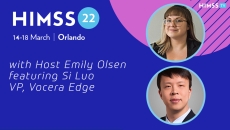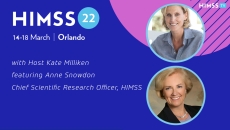Clinical
Si Luo, vice president of Vocera Edge, discusses ways to implement new technologies and improve the overburdened clinician's workflow.
University of Utah Health, Regenstrief Institute and Hitachi this past week announced the development of a new artificial intelligence approach that could help improve treatment for patients with Type 2 diabetes mellitus.
Dave Vennergrund, GDIT vice president of artificial intelligence and data insights, discussed the software's potential to assist in screening patients for possibly harmful diseases.
Rich Corbridge, CIO at Boots UK and Ireland, discusses how the pandemic transformed clinician and patient attitudes toward technology and how digital tools can help improve personalized healthcare.
Novant Health Enterprises will focus first on three areas: clinical transformation, expansion into non-acute settings and technology commercialization.
Dr. Tom Zaubler, chief medical officer at NeuroFlow, explains how IT is merging physical and behavioral healthcare.
Anne Snowdon, chief scientific research officer at HIMSS, discusses the pandemic's effects on the healthcare supply chain and how providers became agile.
David Lareau, CEO of Medicomp Systems, talks about the convergence of technology and regulatory requirements to enable more seamless data exchange for care coordination and patient empowerment.
Algorithms on pulse rate and other indicators are tied into the EHR to alert rapid-response teams.
Dr. Darin Vercillo, chief medical officer at About Healthcare, discusses these challenges and others – and describes how new technologies are boosting care coordination and enabling quick, efficient transfers.









